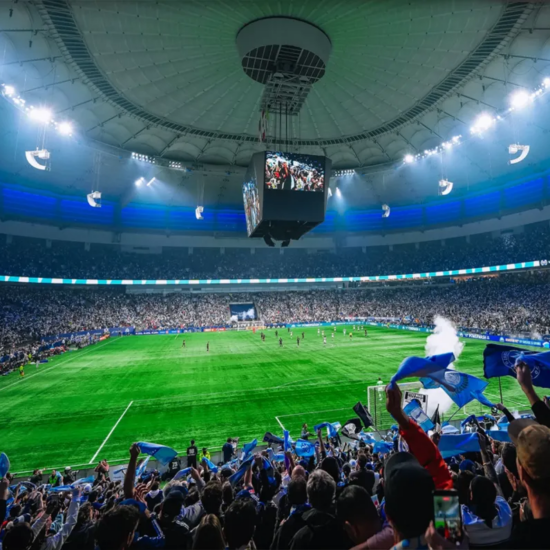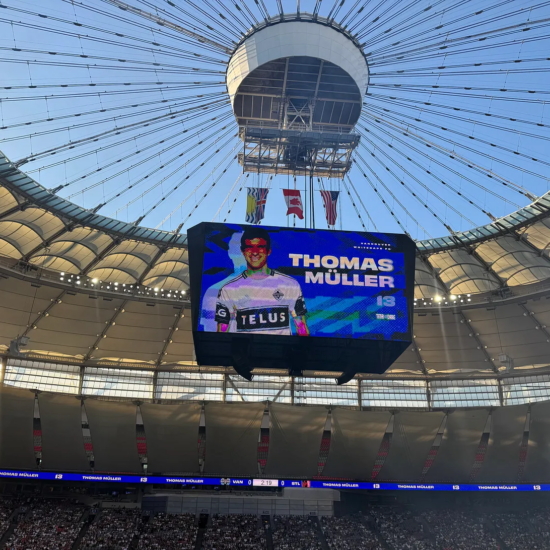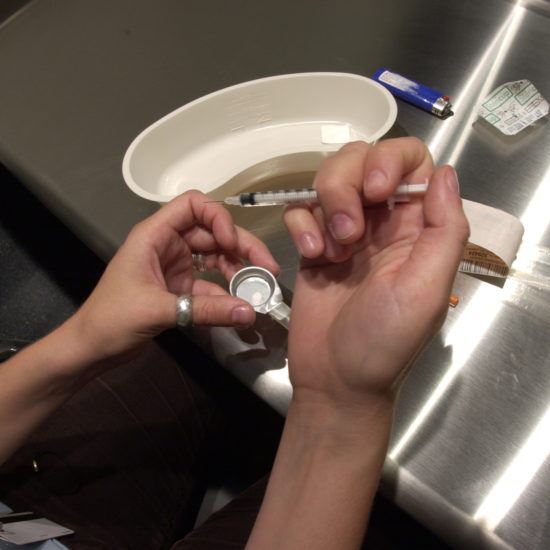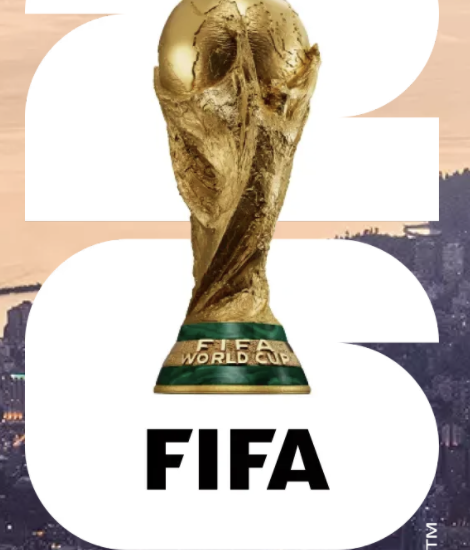
Bob Mackin
Telus is on Vancouver Whitecaps jerseys through 2027, taking the place of original sponsor Bell.
But don’t expect a Telus sign to replace the marquee on B.C. Place Stadium.

Whitecaps’ star Ryan Gauld modelling the new Telus-sponsored jersey (Whitecaps/MLS)
When the stadium reopened in 2011 after undergoing a $514 million renovation, signs reading “Telus Park” were supposed to be installed as part of a $40 million, 20-year agreement.
The Whitecaps had insisted on using the “Bell Pitch” monicker on match days, which made an already complicated situation even more so. In June 2011, the BC Liberal cabinet suddenly had cancelled bids from across the industry on nine government contracts, including Crown corporations and health authorities, and bundled it all for Telus on a $1 billion, 10-year term, plus extensions. That agreement is scheduled to expire this July.
In March 2012, however, cabinet decided it would remain B.C. Place and the lost revenue opportunity would be made up from ad sales.
Jill Schnarr, Telus’s chief communications and brand officer, was asked in the wake of the Whitecaps’ Feb. 16 announcement whether Telus would revisit its original proposal for naming rights or whether it has been in any negotiations since the cabinet cancelled the deal in 2012.
Schnarr didn’t respond, but director of public relations Donna Ramirez offered a flat: “The answer is no to your questions.”
The Whitecaps announced Bell’s departure on Jan. 9, which wasn’t a surprise after Major League Soccer sold league-wide broadcast rights to Apple TV for 10 years at US$2.5 billion, a vast improvement on the US$90 million a year from ESPN, Fox Sports and Univision.
Bell Media isn’t entirely out of the picture. TSN will carry 14 matches in 2023, kicking-off with the Feb. 25 home opener against Real Salt Lake.
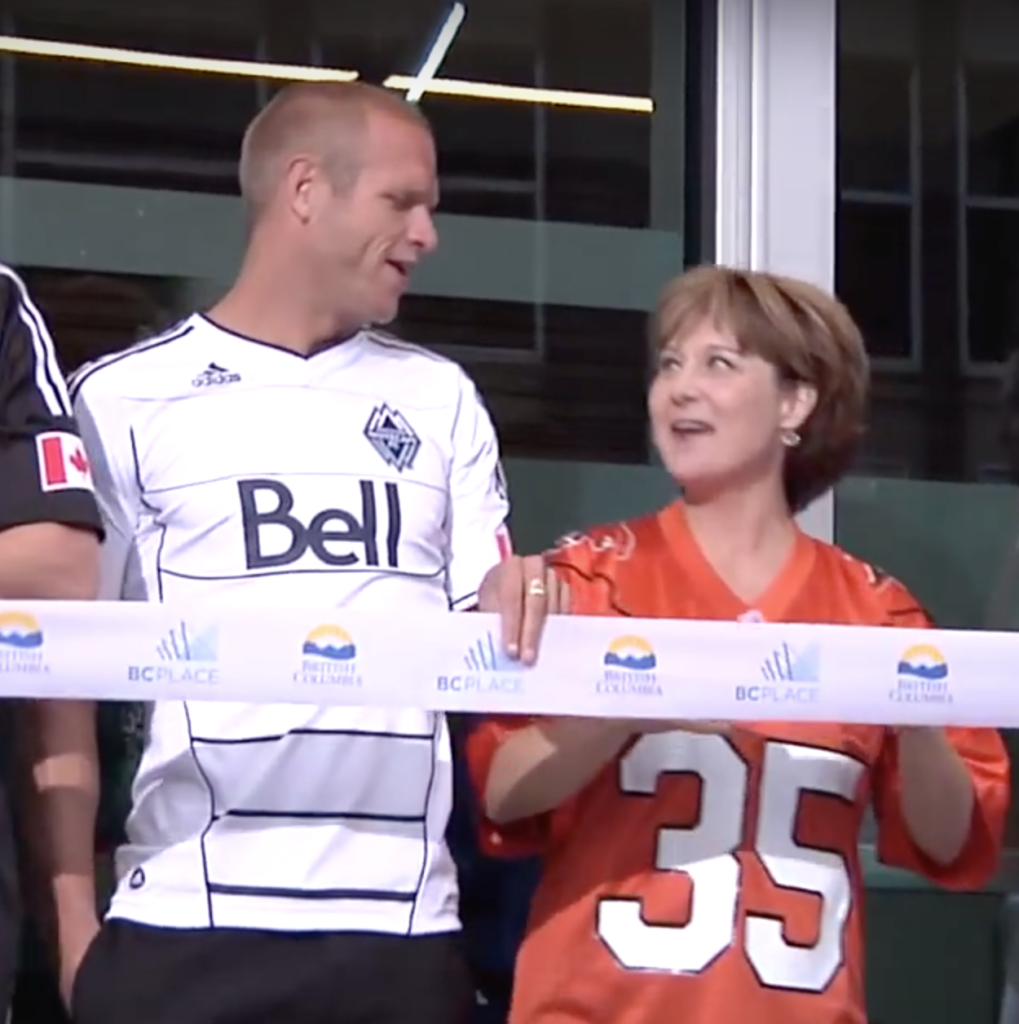
Whitecaps’ captain Jay DeMerit (left) and Premier Christy Clark at the Sept. 30, 2011 reopening of B.C. Place Stadium (Whitecaps)
After the naming rights controversy died down 11 years ago, taxpayers spent $15.2 million to compensate Telus for the StadiumVision TV system, telecommunications network and external video boards. Telus sourced equipment from Cisco Systems, Avaya Canada and Siemens Enterprise Communications.
Before the 2017 change in government, B.C. Pavilion Corporation (PavCo) had negotiated a sponsorship addendum to the Whitecaps’ original 15-year tenancy, aimed at resolving the long-simmering naming rights feud. It was finally released under freedom of information after the Whitecaps lost a B.C. Supreme Court challenge in 2020.
The Whitecaps sought the amendment for advertising and sponsorship activations outside of the stadium’s inner bowl. PavCo retained the right to sell naming rights for the stadium itself, but committed to engaging with the Whitecaps on the issue “in a collaborative and integrated manner.” Whitecaps were to pay PavCo $225,000 annually through 2021, then $25,000-a-year increases, maxing out at $325,000 in 2025.
A year-and-a-half after the NDP minority government took over in 2017, PavCo went back to the market in February 2019 to find a naming rights sponsor.
It was looking for the right partner with the right brand and activation strategy, community engagement plan and, most importantly, fees and term. Ian Aikenhead, chair of the Crown corporation at the time, hoped to have a deal by summer 2019.
The industry was still abuzz after Scotiabank agreed to a 20-year, $800 million package in 2018 to rebrand the home of the Toronto Maple Leafs and Toronto Raptors.
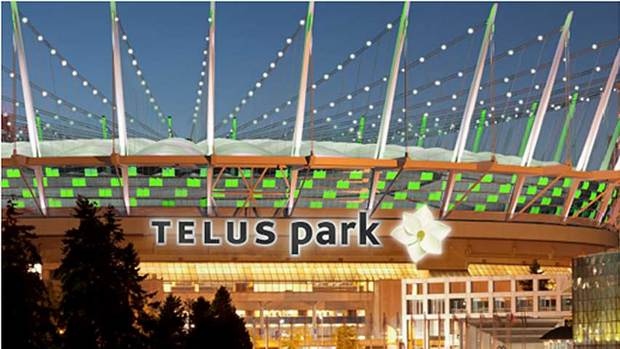
B.C. Place Stadium was supposed to become Telus Park, but Clark nixed the naming rights deal.
Next door to B.C. Place, Rogers took over naming rights of the Canucks’ home from General Motors in 2010 for a reported $60 million over a decade (since renewed to 2033).
National and international brands responded to the B.C. Place request for proposals, partly because it is the last big stadium north of Mexico without a sponsor’s name affixed to the building and/or playing surface.
A source said one of the companies that showed interest was Huawei. At the time, the Chinese tech company was expanding in Canada and running a significant advertising campaign to counter publicity from chief financial officer Meng Wenzhou’s Vancouver house arrest while contesting extradition to the U.S. to face fraud charges.
PavCo deliberations went on longer than expected. Then the pandemic hit, wreaking havoc for corporate marketing budgets and temporarily shutting down the event industry and the project was shelved.
Support theBreaker.news for as low as $2 a month on Patreon. Find out how. Click here.






